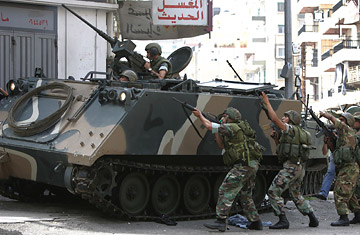
Lebanese soldiers, take up positions next to their APC armored personnel carrier during clashes with fighters from an Islamic militant group, in the north city of Tripoli, Sunday May 20, 2007.
Some 50 people were killed Sunday in a series of intense gun battles fought in the streets of Tripoli itself and nine miles north of the city in the Nahr al-Bared Palestinian refugee camp, which is also headquarters of the Fatah al-Islam faction. The violence spread to Beirut late Sunday when a 22-pound bomb exploded in a car park in the Ashrafieh district of east Beirut, killing one woman and wounding 12 others.
By Monday morning, calm had returned to central Tripoli, but the Lebanese government vowed to continue its offensive against militants holed up in Nahr al-Bared. The Lebanese government believes that the sudden surge of violence is linked to moves by members of the United Nations Security Council to appoint an international tribunal to try suspects in the 2005 assassination of Lebanese prime minister Rafik Hariri. Though Syria has denied any involvement, many believe it was behind the killing. "The pro-Syrian opposition has reached a complete political deadlock and the international tribunal is about to be passed by the United Nations. That's the reason why we are seeing this violence," Marwan Hamade, Lebanese minister of telecoms and a leading anti-Syrian politician told TIME.
Fatah al-Islam has dominated security news in Lebanon since it first declared its existence late last year. The Sunni extremist group said it had split from Fatah al-Intifada, a pro-Syrian Palestinian faction which is headquartered in Damascus, and that its goal is to fight for the Palestinian cause. But divining the real identity of Fatah al-Islam has become mired in Lebanon's political crisis and the answer to what the group's real agenda is depends on whom you ask. The anti-Syrian March 14 coalition, which forms the backbone of the Lebanese government, believes that the group is linked to al-Qaeda but was planted in Lebanon by Syrian military intelligence to cause instability.
Lebanese authorities have accused the group of a twin minibus bombing in the Christian town of Ain Alaq in February in which three people were killed. They also believe Fatah al-Islam members carried out at least three bank robberies, the latest on Saturday when $120,000 was stolen from a bank in the coastal town of Amioun south of Tripoli.
Some analysts in Lebanon say that Syrian intelligence has a long history of working with Palestinian Islamist groups in Lebanon, notably Esbat al-Ansar, based in the Ain al-Hilweh refugee camp in south Lebanon. Esbat al-Ansar is included on the U.S. list of international terrorist organizations. "Syrian intelligence has been working with groups like this for 20 years. It's an old practice," says Radwan al-Sayyed, a professor of Islamic studies at the Lebanese University and a speech writer for Prime Minister Fouad Siniora.
But others argue that blaming Syria for all Lebanon's problems is the default position of the March 14 coalition and the government, and that Fatah al-Islam is a genuine Islamist organization dedicated to the Palestinian cause. Tripoli resident Mohsen Mohammed, 35, an adherent of the strict Salafi school of Sunni Islam and a sympathizer of Fatah al-Islam, says that the group's popularity has been steadily increasing in the Nahr al-Bared camp. "They help people by giving them food and aid. They are very disciplined and polite and never carry arms in the camp except at times of trouble," he says.
